Anniversary to the fore at 56th Annual Elizabethan Union Dinner Debate
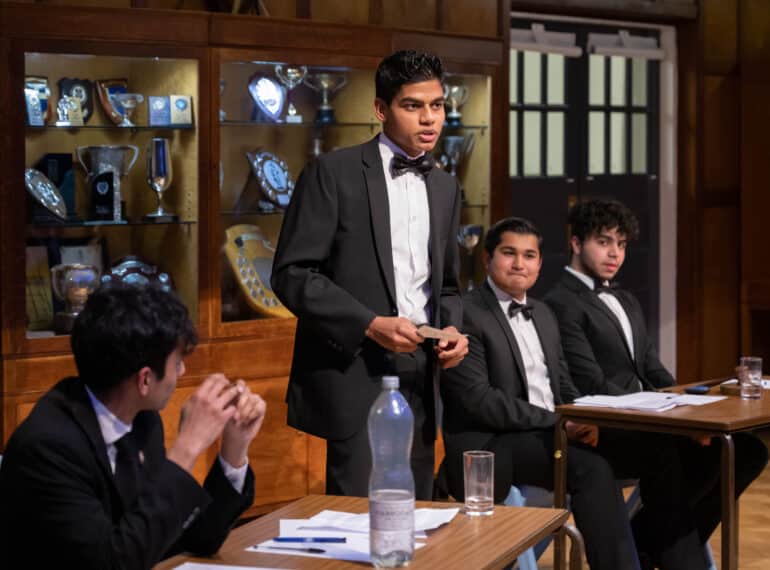
With the QE 450th anniversary celebrations at the forefront of everyone’s mind, the subject chosen for this year’s Dinner Debate was especially apt.
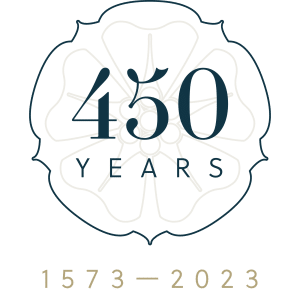 Sixth-formers gathered to take on the visiting Old Elizabethans, debating the motion, This House would leave the past behind us.
Sixth-formers gathered to take on the visiting Old Elizabethans, debating the motion, This House would leave the past behind us.
In his address, Saifullah Shah (OE 2013–2020) alluded to the anniversary year, which has as its slogan, Thriving from ancient roots.
And there were reminders of the 450th anniversary celebrations even during the meal: dessert was served accompanied by white chocolate discs bearing the anniversary logo.
Headmaster Neil Enright said: “The Dinner Debate was a successful evening, continuing the happy and energetic mood from our thanksgiving service in Westminster Abbey and with a motion that caused us to think about the nature and importance of the past, while looking to the future. It certainly provoked some lively discussion, taking the debate down a number of interesting avenues.”
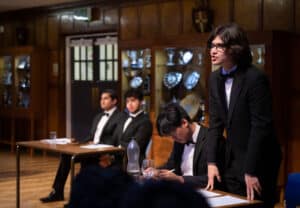 “The dinner participants also made a little bit of history themselves: our 2022 School, Captain Theo Mama-Kahn, led the loyal toast to ‘The King’, rather than ‘The Queen’, for the first time in the Dinner Debate’s history.”
“The dinner participants also made a little bit of history themselves: our 2022 School, Captain Theo Mama-Kahn, led the loyal toast to ‘The King’, rather than ‘The Queen’, for the first time in the Dinner Debate’s history.”
The event, which this year was chaired by Jai Patel, of Year 13, helps prepare the boys for some of the social occasions they may encounter early in their time at university. The debate follows the Oxford/Cambridge Union style.
With its distinctive atmosphere, it also serves as somewhat of a staging post between the boys’ present as pupils and their future as Old Elizabethans.
“The Dinner Debate is important in promoting oracy and free-thinking scholarship, but it is also a fun and relaxed evening, which most seem to enjoy!” the Headmaster added.
Before the debate, the votes were counted as follows: 14 for; 126 against; 30 abstentions.
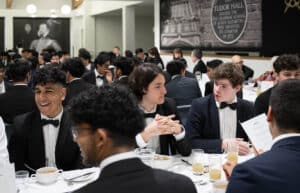 The motion was proposed by the Year 13 pair of Ashwin Sridhar and Sudhamshu Gummadavelly. Opposing it with Saifullah was Mipham Samten (OE 2012–2019). Many Year 13s contributed from the floor.
The motion was proposed by the Year 13 pair of Ashwin Sridhar and Sudhamshu Gummadavelly. Opposing it with Saifullah was Mipham Samten (OE 2012–2019). Many Year 13s contributed from the floor.
Ashwin and Sudhamshu argued that ‘leave’ does not mean ‘forget’, making the case that the past and its injustices should not be allowed to define the future, and that we should move forward with equality of opportunity (rather than imposing discrimination of a different form, such as quotas to seek redress). They cited as a positive example the reconciliation seen in Spain after its civil war and the end of General Franco’s regime, where old differences were left behind.
The opposing OEs defined the key term differently, accusing the boys of wanting to ‘have their cake and eat it’. Those who ignore history are doomed to repeat its errors.
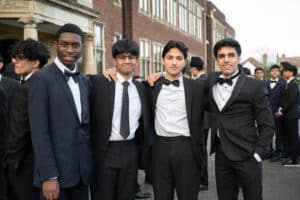 However, at the end of the debate, the proposers’ case had won many over, and the final totals were: 76 for; 55 against; and 39 abstentions. Thus, it was a victory for the School, the Upper Sixth pair successfully convincing people that the past could be left behind, even while its lessons were still being learned.
However, at the end of the debate, the proposers’ case had won many over, and the final totals were: 76 for; 55 against; and 39 abstentions. Thus, it was a victory for the School, the Upper Sixth pair successfully convincing people that the past could be left behind, even while its lessons were still being learned.
In his address, Saifullah, a third-year Law student at Downing College, Cambridge, began thus: “From the celebration of this School’s 450th anniversary, the motion of the upcoming debate and the range of familiar faces on display, the past would appear to have all of us in its embrace tonight.”
He related how he had suffered some early disappointments at Cambridge in moots (mock judicial proceedings set up to examine a hypothetical case as an academic exercise) and was considering stopping doing them altogether, but then scored a memorable success after applying to take part in a Cambridge Union debate. “Given the stakes and the competition, I had no expectations going into the audition. But I also had nothing to lose and, against all the odds, I prevailed. My fellow speakers included a Queen’s Counsel, a Cambridge Professor and most memorably, Lord Neuberger and Lord Sumption, two former justices of the Supreme Court. Debating alongside my childhood heroes whose judgements had helped inspire me to study law was a surreal experience, and one that I will never forget.”
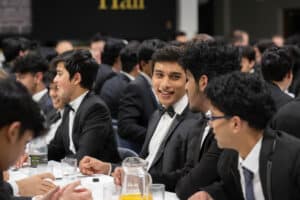 The experience heralded an era of competition success for Saifullah: he has now a record ten mooting and mock trial competitions, and has been a student speaker in six Cambridge Union Debates, the most in recent history.
The experience heralded an era of competition success for Saifullah: he has now a record ten mooting and mock trial competitions, and has been a student speaker in six Cambridge Union Debates, the most in recent history.
He concluded by telling the assembled sixth-formers: “Your time in school will not define your legacy and your purpose as students is not to reap fruit but to sow seeds. You don’t need to be School Captain or valedictorian, and it is often the trees that bloom latest that have the perfect blossom. The road ahead of you is tough, it is treacherous, and it will push you to your limits. But if you walk your path with courage, with conviction and with hope, then you will not only survive but thrive.”
